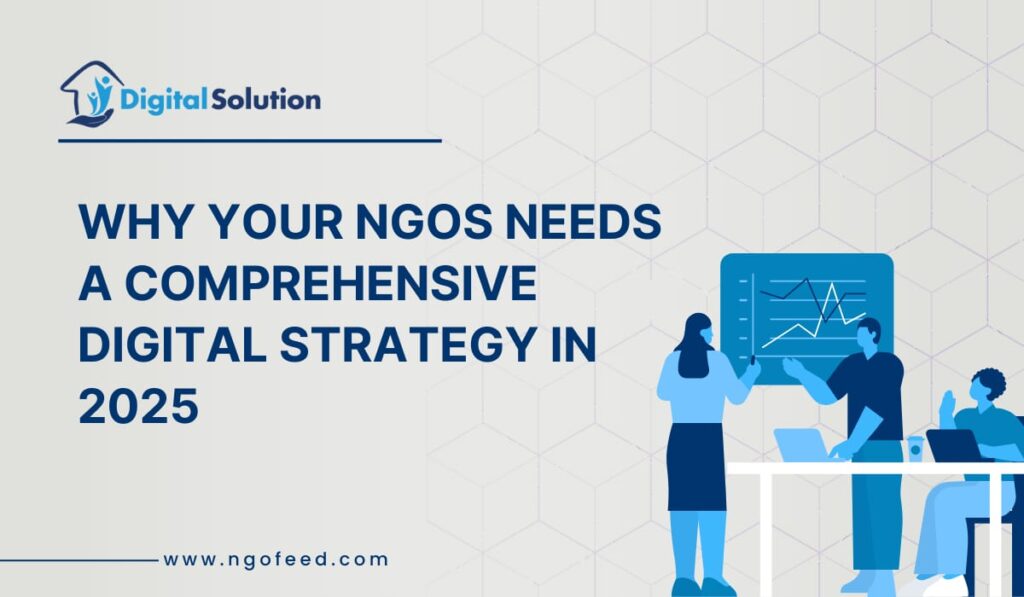Why Your NGO Needs a Comprehensive Digital Strategy in 2025: In an increasingly interconnected world, non-governmental organizations (NGOs) are increasingly concerned with navigating the rapidly changing technological landscape. A comprehensive digital strategy has become a key requirement for NGOs seeking to increase their impact, improve their efficiency, and engage with stakeholders. As we enter 2025, the need for action is more urgent than ever, given the critical role technology has played in shaping social narratives and driving global change.
Table of Contents
1. Digital Technology for NGOs
is becoming a good thing. With the global proliferation of smartphones, affordable internet access, and websites, audiences now expect seamless online interactions. Nongovernmental organizations must embrace this digital transformation to remain relevant and competitive.
Practical strategies that help organizations:
- Expand their reach: Networking removes geographical barriers, helping NGOs connect with global audiences.
- Increase transparency: Online tools facilitate timely reporting and accountability, building trust with donors and stakeholders.
- Improve tools: System software makes it easier to operate, reduces costs, and increases efficiency.
- Driving Impact: Data analytics provides insights that improve decision-making and increase program effectiveness.
Also Read: How to Use Facebook Ads to promote your NGOs mission
2. Key Elements of a Successful Digital Strategy
In order for NGOs to develop a successful digital strategy, several key elements need to be considered:
- Social media: The website should be user-friendly, easy to use, and search engine optimized (SEO).
- Using tools like Google Analytics and donor management software, NGOs can get actionable insights.
3. Innovation in Fundraising.
- Traditional fundraising techniques are being replaced by digital options such as crowdfunding, online donation platforms and campaigns. These tools will not only expand your donor base, but also provide a way to make money.
- The implementation of strict cyber security measures is essential to maintain the integrity of the institution and the trust of the stakeholders. By 2025, trends such as short video content, immersive storytelling, and collaboration will play a major role in the system.
Also Read: Nonprofit Branding
In order to remain relevant, NGOs must:
- Develop a platform-specific strategy: Tailoring includes the various features of platforms such as Instagram, TikTok, LinkedIn, and Facebook.
- Personal Communication: Personal communication, powered by AI, cultivates deeper connections with your audience.
4. The role of new technologies
New technologies are changing the way NGOs in India work and interact with their stakeholders:
Information
- Discuss donor behaviour and mobilization struggles.
- Follow social media trends.
b. Smart contracts facilitate the funding process by providing efficient asset allocation.
c. Virtual and Augmented Reality (VR/AR): VR/AR provides immersive experiences, allowing developers and partners to interact with projects on a deeper level, including inspecting project locations.
5. Building capacity for data transformation
Data transformation is more than just using technology; it requires a cultural shift in the organization. NGOs should:
- Invest in training: equip employees with the necessary digital skills through online training and workshops.
- Promote collaboration: We promote collaboration across departments to better integrate digital tools.
- Hire experts: Partner with technology companies and consultants to provide customized solutions.
Also Read: How Digital Solutions Can Change Your NGOs Impact
6. Barriers to Implementing a Digital Strategy
Despite the benefits, implementing a digital strategy comes with challenges:
- Limited resources: For NGOs operating on modest budgets, it is difficult to use digital tools.
- Resistance to change: Lack of governance can make it difficult to implement new technologies.
- Data privacy: NGOs must follow strict guidelines to respect and protect the data of their partners.
- Digital divide: Reaching underrepresented populations with limited internet access is a major challenge.
To address these barriers, NGOs should focus on strategic planning, seek support for system-wide initiatives, and advocate for technology policy.
7. Measuring the impact of digital strategies
In order to accurately determine the effectiveness of an effective strategy, NGOs must establish clear criteria. Key performance indicators (KPIs) may include:
- Website traffic and engagement metrics.
- Social media has reached the level of friendship.
- Collect results through system channels.
- Coworker Satisfaction Score.
- Programmatic solutions make digital tools easy.
Also Read: Benefits of Microsoft 365 for Nonprofits
8. Case studies: Digital success stories from NGOs
- Charity- Water uses digital storytelling to demonstrate its impact, combining engaging visuals with clear storytelling to build donor trust.
- UNICEF: It innovatively implements mobile technologies, such as the U-Report platform, to support youth engagement and feedback collection.
- WWF Earth Hour: The World Wildlife Fund (WWF) successfully mobilized millions of people around the world to participate in the Earth Hour initiative through a social media campaign.
9. The Future of Non-Government Digital Privacy
As technology advances, NGOs must stay ahead of new trends to stay relevant:
- Be mobile-friendly: As mobile devices become the primary means of accessing the internet, NGOs will prioritize mobile phones first. Close.
- Focus on sustainability: Green technologies and digital carbon footprint will become more important in NGOs.
- Decentralized platforms: Decentralized networks and blockchain can transform donor relationships and governance processes.
Also Read: How to Start a Marketing Campaign for Nonprofits
Summary: Embracing the digital future
A deep digital strategy will be essential for NGOs in 2025. It is a vital tool for them to do their work in a complex world. By embracing technology, NGOs can expand their influence, mobilize their resources, and make a lasting impact. The journey to digital transformation requires commitment, innovation, and change, but the benefits far outweigh the obstacles. As the digital landscape continues to evolve, NGOs that commit to embracing this change will be prepared to make significant changes in the future.



